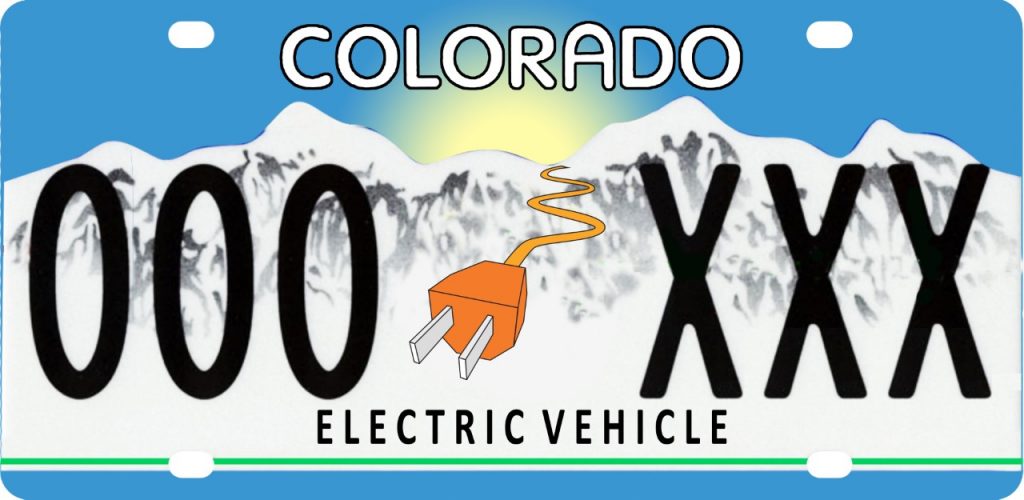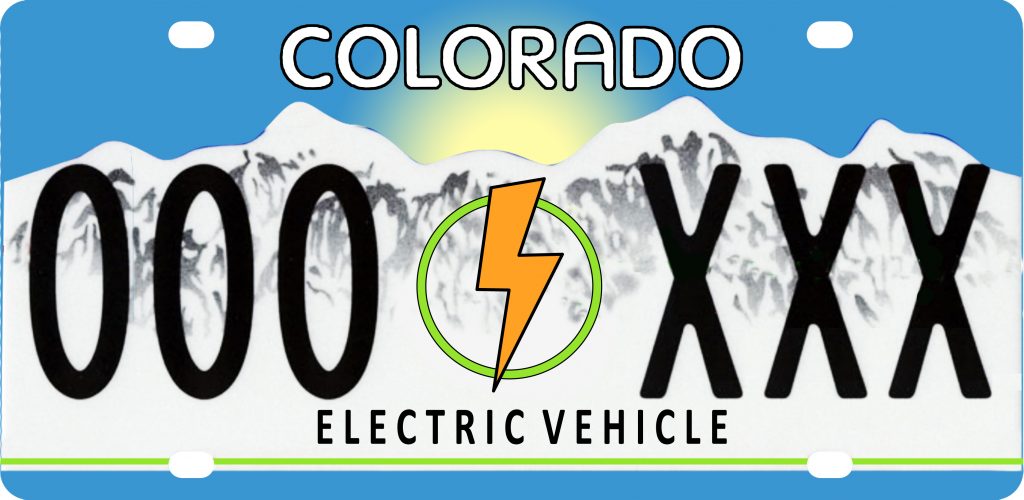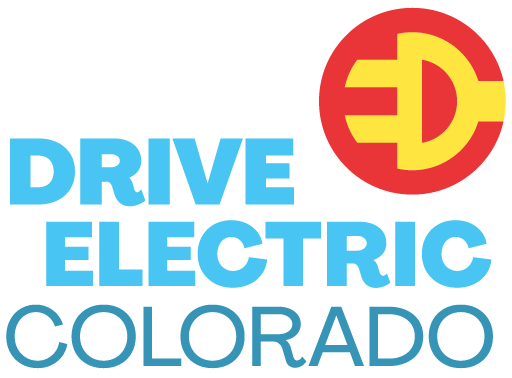Electric Vehicle License Plate Bill
Updated, July 29, 2021: This bill was successfully passed and signed on 6/25/21 with support from representatives Edie Hooton, Alex Valdez, and Jeff Bridges, and was devoted $91,636 for use by the division of motor vehicles. This bill was assigned to the Colorado House Energy and Environment Committee. There were some committee members who did not want the license plate to be mandatory. However, the mandatory requirement remained through several iterations and changes to the final bill, and it did pass out of committee. At that point it went for vote to the entire legislature where it passed in both chambers, and was then signed by Governor Polis to become law. By passing, this allows the Department of Revenue to go into the next phase of license plate production and DMV processing. Currently, the plate is undergoing a final draft design review (updated draft pictured below, right) and will need to meet state requirements before it moves into the production phase. The main changes to this license plate were replacing the electric vehicle plug with a lightning bolt, as representatives felt this was a more clear and simple representation of an electric vehicle. While the timeline is still uncertain, drivers can expect to see this license plate on the road within a year. It will automatically be given to individuals who purchase a new EV, but individuals may also opt for a vanity plate instead. Those with existing EVs should be able to request one of the new EV plates as well.
Bill LeBlanc spoke with us about an exciting new piece of legislation that he’s been thinking about for the past five years and working on since October of 2020: the Electric Vehicle License Plate Bill. From the drafted legislation, this bill “establishes the electric vehicle license plate, which is issued for use on plug-in electric motor vehicles. The electric vehicle license plates are issued to the owner of a plug-in electric motor vehicle upon registration of the vehicle and payment of applicable fees and taxes, unless the owner elects an alternative license plate.” This license plate will be the default plate given to all new electric vehicle owners when they register, but individuals can also opt for other plates. There are no additional fees other than a regular license plate registration, unless the individual opts into a personalized plate instead.
When Bill got a Nissan LEAF in 2013, there was no signage or marking that indicated it was an electric car, so other drivers and passengers had no awareness of it unless they were already familiar with the LEAF. The idea for this bill was birthed behind the concept of making every electric vehicle a ‘mobile billboard’ of sorts to advertise the electric vehicle ‘brand’ as a whole. When people become more familiar with a car, they’re more likely to buy one and are also more likely to follow what their neighbors and community are doing rather than diverging on their own path. An electric vehicle license plate is a solution to bring awareness to this issue.
In the summer of 2020,E Source, the company Bill works for, was hired by the Colorado Energy Office to conduct deep EV consumer research and develop an Education and Awareness Roadmap for Colorado. By having participants identify between photographs of electric and gas-powered cars, they found that only 9% of Coloradoans were very familiar with electric vehicles, aside from Tesla models. This survey included representation from all areas and ranges around Colorado including lower-income populations, demonstrating the lack of education and awareness many Coloradoans face regarding the electric vehicle landscape. It is the hope that if and when this bill passes, that it will accelerate electric vehicle adoption to reach the CEO’s goal of 940,000 electric vehicles on the road by 2030.


A prototype design of what the license plate might look like features an electric vehicle plug and charging cord leading into the sun setting into the mountains below Colorado’s blue skies. The charger, a regular household plug, displays the ability of an electric vehicle to be plugged into a regular 110v outlet (the same outlet you’d use to charge a phone or plug in a TV, for example) and attempts to dispel the myth that electric vehicles are confusing to charge. The plug leading to the sun denotes a connection to solar energy that can be used to power electric vehicle charging and the blue skies connects electric vehicles with the improved air quality and clean, clear air.
The bill is still in the process of getting through the legislative session but is likely to be signed by June and will then need to be signed by Governor Polis to pass. To support this bill as an individual, you can call or email your local representative in favor of it. If you are part of an organization that supports this bill, you can write a letter to Bill endorsing it.
As a 501(c)(3) nonprofit operating in Colorado, we do not lobby or attempt to influence legislation.




